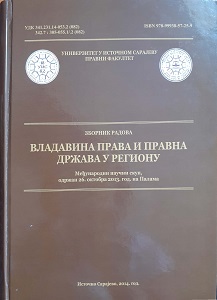Разлози честог формирања ванредних судова у Србији 1839-1844
The Reason Why Extraordinary Criminal Courts Were Often Established in Serbia 1839-1844
Author(s): Uroš Stanković
Subject(s): History of Law, Constitutional Law, Criminal Law, 19th Century
Published by: Правни факултет Универзитета у Источном Сарајеву
Keywords: Extraordinary court;History of criminal proceedings in Serbia;The first rule of Mihailo Obrenović (1839-1842);Rule of the constitution;
Summary/Abstract: The article is intended to determine why extraordinary criminal courts were frequently established in Serbia in the period between 1839 and 1844. In aforementioned five-year period, eight extraordinary courts were set up. Besides, four other propositions had been put forward to constitute extra-ordinary court, but were rejected. Significant number of propositions for establishing extraordinary courts and significant numbers of extraordinary courts which were actually established requires an explanation as to why this unfavoured institution was to such an extent popular among Serbian governments of that time.The reasons for extraordinary courts appearing in many instances can be divided into two groups – official and unofficial. Official reasons are stated in the acts proposing constitution of extraordinary courts. Five of them were mentioned. Those are: multitude of co-perpetrators, offenders being domiciled in different districts, the nature of crime and expedition of trial where co-perpetrators were of different statuses (the military and civilians). Hardly ever would only one factor be stated as the reason for set-ting up an extraordinary court. Usually two of them appear among which nature of crime and expedition of trial are coupled most recurrently.Unofficial reasons comprise social and legal consciousness, under-development of the judiciary, political instability and desire to quell political opposition. The last-mentioned stands out as the unofficial reason of greatest significance.Which of two groups of reasons had prevailing influence over government to set up extraordinary courts? In order to answer that question, one must apply comparative method. In other words, it means that the presence of more constant, formal reasons in aforementioned five-year term should be compared with their occurrence in subsequent period. The comparison reveals that unofficial reasons predominate over official ones.
- Page Range: 830-844
- Page Count: 15
- Publication Year: 2013
- Language: Serbian
- Content File-PDF

